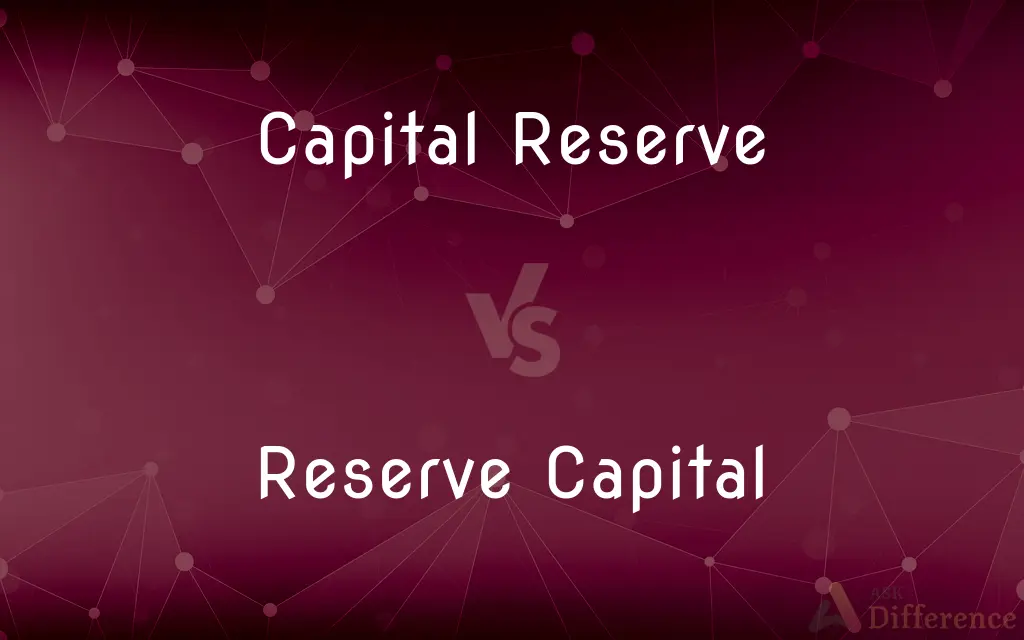Capital Reserve vs. Reserve Capital — What's the Difference?
By Tayyaba Rehman — Published on December 23, 2023
Capital Reserve is an account used to fund future company projects or cover long-term contingencies, while Reserve Capital represents the unpaid portion of the issued share capital.

Difference Between Capital Reserve and Reserve Capital
Table of Contents
ADVERTISEMENT
Key Differences
Capital Reserve is an amount set aside from a company's profits for specific purposes, often to cover future expenses or losses. On the contrary, Reserve Capital is not immediately called upon but can be demanded when needed, representing the uncalled portion of a company's issued capital.
While Capital Reserve is created to strengthen the financial position of a company by providing a cushion for unforeseen future liabilities, Reserve Capital stands as a safety net, indicating the maximum potential liability of shareholders to contribute towards company debts.
It's pivotal to recognize that Capital Reserve is often derived from non-operating profits, such as gains from the sale of assets. Reserve Capital, however, is related to a company's capital structure and its ability to call upon shareholder funds in dire circumstances.
The use of Capital Reserve is generally restricted, ensuring it's utilized for its intended purpose like business expansion or debt repayment. Reserve Capital, being part of the share capital, showcases the potential financial commitment of shareholders, even if it's not yet realized.
In essence, Capital Reserve underlines a company's prudence in financial planning, allocating profits for potential needs. Reserve Capital, however, is more about the company's right to demand payment from shareholders, reinforcing its potential financial reservoir.
ADVERTISEMENT
Comparison Chart
Purpose
Set aside for specific future needs or contingencies
Represents the uncalled portion of issued share capital
Origin
Derived from non-operating profits, like sale of assets
Relates to company's capital structure
Usage
Restricted for its intended purpose
Can be called upon in dire circumstances
Financial Implication
Strengthens the company's financial position
Indicates potential liability of shareholders
Association
Linked with profits
Linked with company's issued capital
Compare with Definitions
Capital Reserve
A restricted fund to safeguard against unexpected contingencies.
The Capital Reserve will be utilized to settle unexpected long-term debts.
Reserve Capital
Funds that shareholders are committed to pay if called upon.
Shareholders are aware that they might need to contribute towards the Reserve Capital if required.
Capital Reserve
Funds reserved from profits for specific future company needs.
The company created a Capital Reserve to fund its upcoming expansion project.
Reserve Capital
The portion of share capital not immediately called up.
The company's Reserve Capital signifies potential funds they can demand from shareholders.
Capital Reserve
Amounts derived primarily from non-operating gains.
After selling a factory, the gain was added to the Capital Reserve.
Reserve Capital
Represents shareholders' maximum potential financial commitment.
The Reserve Capital indicates the utmost shareholders might need to contribute.
Capital Reserve
An allocation meant to handle future liabilities or losses.
The firm's Capital Reserve ensures they can handle unforeseen financial challenges.
Reserve Capital
Uncalled capital that can be demanded in adverse situations.
In case of financial crisis, the company might call upon its Reserve Capital.
Capital Reserve
A financial provision signaling company prudence.
Their sizable Capital Reserve demonstrates excellent financial foresight.
Reserve Capital
A financial provision showcasing a company's potential capital reservoir.
The substantial Reserve Capital demonstrates the firm's robust financial backing.
Common Curiosities
Can Capital Reserve be utilized freely?
No, Capital Reserve usage is typically restricted to its designated purpose.
When might a company call upon its Reserve Capital?
In adverse financial situations or when facing severe debt.
What is the primary purpose of Capital Reserve?
Capital Reserve is used to cover specific future company needs or financial contingencies.
How does Reserve Capital relate to shareholders?
Reserve Capital represents the unpaid portion of the issued share capital shareholders might be asked to pay.
Why might a company not immediately call its entire share capital?
To provide flexibility and call upon Reserve Capital only when needed.
Is Capital Reserve derived from regular business profits?
Not necessarily; it often comes from non-operating profits like asset sales.
Can the amount in Capital Reserve decrease?
Yes, if it's used for its intended purpose like settling liabilities.
Can Reserve Capital be turned into issued capital?
Yes, when it's called upon and paid by shareholders.
Do all companies maintain a Reserve Capital?
Not necessarily; it depends on the company's capital structure and strategy.
Are Capital Reserves mandatory for companies?
No, but they're prudent for financial planning and risk management.
Does Reserve Capital affect a company's valuation?
It can, as it indicates the potential financial support the company can call upon.
Does Reserve Capital indicate money the company already has?
No, it represents potential funds the company can demand from shareholders.
Is Reserve Capital a liability?
It's a potential liability for shareholders, indicating their maximum financial commitment.
How does Capital Reserve benefit a company's financial health?
It provides a cushion against unexpected financial challenges.
Are there legal regulations governing Capital Reserves and Reserve Capital?
Yes, regulations vary by country and are designed to protect stakeholders.
Share Your Discovery

Previous Comparison
Additive Colors vs. Subtractive Colors
Next Comparison
Beach Tent vs. Camp TentAuthor Spotlight
Written by
Tayyaba RehmanTayyaba Rehman is a distinguished writer, currently serving as a primary contributor to askdifference.com. As a researcher in semantics and etymology, Tayyaba's passion for the complexity of languages and their distinctions has found a perfect home on the platform. Tayyaba delves into the intricacies of language, distinguishing between commonly confused words and phrases, thereby providing clarity for readers worldwide.














































